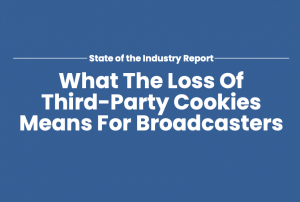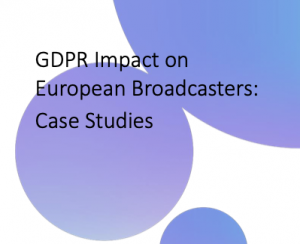 This study by Borrell Associates, “State of the Industry Report: What The Loss Of Third-Party Cookies Means For Broadcasters,” examines the phase-out of third-party tracking cookies used in digital advertising to estimate the financial impact on broadcasting. The research used interviews with broadcast executives and an online survey of 54 broadcasters to gauge the industry’s level of preparedness and identify best practices among those most prepared for the phase-out, which will be completed by the end of 2024.
This study by Borrell Associates, “State of the Industry Report: What The Loss Of Third-Party Cookies Means For Broadcasters,” examines the phase-out of third-party tracking cookies used in digital advertising to estimate the financial impact on broadcasting. The research used interviews with broadcast executives and an online survey of 54 broadcasters to gauge the industry’s level of preparedness and identify best practices among those most prepared for the phase-out, which will be completed by the end of 2024.
The study found the phase-out of third-party cookies offers an opportunity for broadcasters to increase their digital advertising revenue by spurring the development of initiatives focused on first-party data, or data that is set and accessible only by a website owner.
“When it occurs, the phase-out of 3rd-party cookies is likely to deliver more benefit than loss to broadcasters. The main benefit may be that it motivates broadcasters to take control of their own audiences by establishing a 1st party relationship with viewers and listeners who’ve remained anonymous for decades. A secondary benefit could be that broadcasters begin reaching beyond their traditional audiences, developing relationships with new audiences altogether — some of whom may reside outside their traditional broadcast geographies. And that could have broad, positive effects that extend well beyond any revenue generated by digital ad sales.”
The study offers broadcasters with proactive measures they can take to mitigate the impact of the third-party cookie phase-out and opportunities for more direct-to-consumer audience engagement. These measures include educating internal stakeholders and securing team buy-in, accurately gauging the urgency and setting a timeline for response, beginning work on a comprehensive plan, starting to prep site visitors and app users, and focusing on the needs of ad buyers.
 GDPR Impact on European Broadcasters: Case Studies
GDPR Impact on European Broadcasters: Case Studies
This report provides two European broadcaster case studies on their experience going through the EU’s General Data Protection Regulation (GDPR) compliance process and how that impacted their data collection strategies. NAB commissioned Omdia to evaluate the growing restrictions in Europe as a proxy for what is happening in the US, in particular in relation to 3rd party cookies. Omdia interviewed senior decision makers at Vocento and Atresmedia, asking them about their company’s GDPR experience and what can be learned from it. The results highlight the issues they faced, ongoing difficulties and what can be done by other US broadcasters going through similar regulatory changes.
The overriding feedback from the European broadcasters on their experience going through GDPR was that it was less challenging than they had initially feared. However, this should not be a cause for complacency among US broadcasters, as it was partly driven by relatively high levels of consumer protections and regulations that were already in place.

